Nissan Juke VS Subaru Forester – Specs, Efficiency & Price Comparison
Which model is the better choice – the Nissan Juke or the Subaru Forester? We compare performance (143 HP vs 136 HP), boot capacity (422 L vs 508 L), efficiency (4.70 L vs 8.10 L), and of course, the price (21400 £ vs 34700 £).
Find out now which car fits your needs better!
The Nissan Juke (SUV) is powered by a Petrol or Full Hybrid engine and comes with a Manuel or Automatic transmission. In comparison, the Subaru Forester (SUV) features a Petrol MHEV engine and a Automatic gearbox.
When it comes to boot capacity, the Nissan Juke offers 422 L, while the Subaru Forester provides 508 L – depending on what matters most to you. If you’re looking for more power, you’ll need to decide whether the 143 HP of the Nissan Juke or the 136 HP of the Subaru Forester suits your needs better.
There are also differences in efficiency: 4.70 L vs 8.10 L. In terms of price, the Nissan Juke starts at 21400 £, while the Subaru Forester is available from 34700 £.
Compare all the key specs now and find out which model fits your lifestyle best!
Nissan Juke
The Nissan Juke stands out with its distinctive design and bold styling, making it a popular choice for those seeking something different on the road. Its interior cleverly combines modern technology with comfort, offering an enjoyable driving experience for both the driver and passengers. Despite its compact size, the Juke provides a surprising amount of space and versatility, making it suitable for urban adventures and weekend getaways alike.
details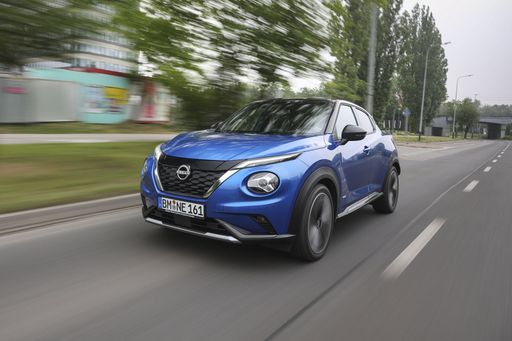 @ germany.nissannews.com
@ germany.nissannews.com
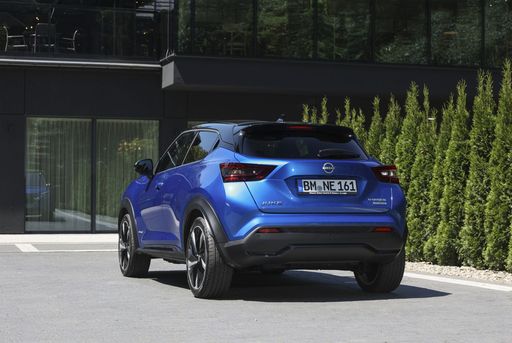 @ germany.nissannews.com
@ germany.nissannews.com
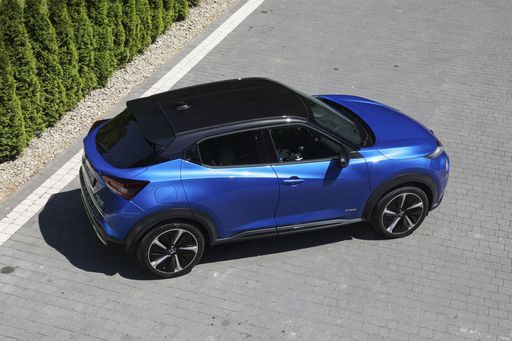 @ germany.nissannews.com
@ germany.nissannews.com
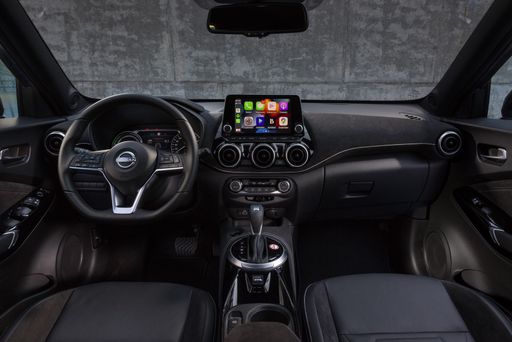 @ germany.nissannews.com
@ germany.nissannews.com
Subaru Forester
The Subaru Forester is a versatile SUV known for its impressive off-road capabilities and practical design. With a spacious interior and advanced safety features, it offers comfort and security for both city driving and outdoor adventures. Its reliable performance and all-wheel-drive system make it a popular choice among those who appreciate a combination of functionality and rugged charm.
details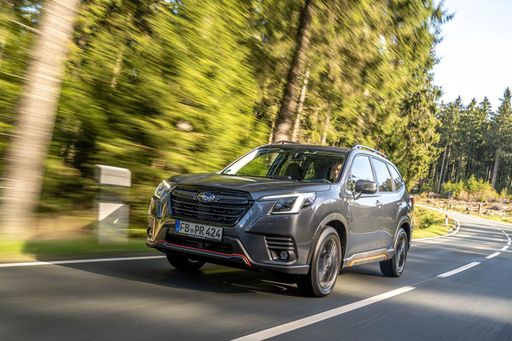 @ Subaru
@ Subaru
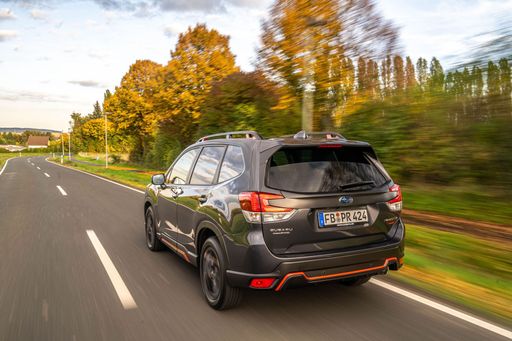 @ Subaru
@ Subaru
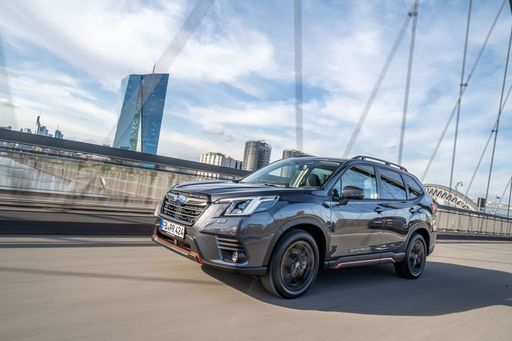 @ Subaru
@ Subaru
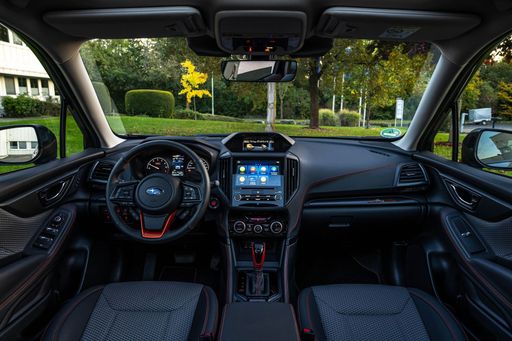 @ Subaru
@ Subaru
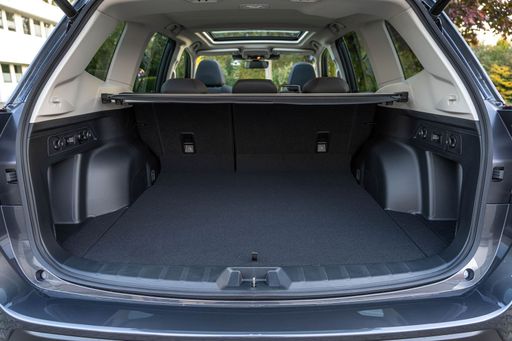 @ Subaru
@ Subaru

|

|
|
|
|
Costs and Consumption |
|
|---|---|
|
Price
21400 - 30100 £
|
Price
34700 - 42200 £
|
|
Consumption L/100km
4.7 - 6 L
|
Consumption L/100km
8.10 L
|
|
Consumption kWh/100km
-
|
Consumption kWh/100km
-
|
|
Electric Range
-
|
Electric Range
-
|
|
Battery Capacity
0.60 kWh
|
Battery Capacity
-
|
|
co2
107 - 136 g/km
|
co2
183 g/km
|
|
Fuel tank capacity
46 L
|
Fuel tank capacity
48 L
|
Dimensions and Body |
|
|---|---|
|
Body Type
SUV
|
Body Type
SUV
|
|
Seats
5
|
Seats
5
|
|
Doors
5
|
Doors
5
|
|
Curb weight
1274 - 1405 kg
|
Curb weight
1693 - 1739 kg
|
|
Trunk capacity
354 - 422 L
|
Trunk capacity
508 L
|
|
Length
4210 mm
|
Length
4670 mm
|
|
Width
1800 mm
|
Width
1830 mm
|
|
Height
1593 mm
|
Height
1730 mm
|
|
Payload
405 - 427 kg
|
Payload
446 - 492 kg
|
Engine and Performance |
|
|---|---|
|
Engine Type
Petrol, Full Hybrid
|
Engine Type
Petrol MHEV
|
|
Transmission
Manuel, Automatic
|
Transmission
Automatic
|
|
Transmission Detail
Schaltgetriebe, Automat. Schaltgetriebe (Doppelkupplung), Automatikgetriebe
|
Transmission Detail
-
|
|
Drive Type
Front-Wheel Drive
|
Drive Type
All-Wheel Drive
|
|
Power HP
114 - 143 HP
|
Power HP
136 HP
|
|
Acceleration 0-100km/h
10.1 - 11.8 s
|
Acceleration 0-100km/h
12.20 s
|
|
Max Speed
166 - 180 km/h
|
Max Speed
188 km/h
|
|
Torque
200 Nm
|
Torque
182 Nm
|
|
Number of Cylinders
3 - 4
|
Number of Cylinders
4
|
|
Power kW
84 - 105 kW
|
Power kW
100 kW
|
|
Engine capacity
999 - 1598 cm3
|
Engine capacity
1995 cm3
|
General |
|
|---|---|
|
Model Year
2024
|
Model Year
2025
|
|
CO2 Efficiency Class
D, E, C
|
CO2 Efficiency Class
G
|
|
Brand
Nissan
|
Brand
Subaru
|
Nissan Juke
Introduction to the Nissan Juke: A Compact SUV with Style
The Nissan Juke has always been a standout in the compact SUV segment, renowned for its bold design and impressive versatility. As we look at the 2024 model year, Nissan continues to innovate, offering a range of options that cater to both practicality and driving pleasure.
Performance and Efficiency: Under the Bonnet of the Nissan Juke
The 2024 Nissan Juke comes with a variety of engine choices tailored to suit different driving needs. With power outputs ranging from 114 to 143 PS, these engines strike a balance between performance and efficiency. The petrol options are equipped with a 1.0-litre three-cylinder engine that generates 114 PS, providing a sprightly drive perfect for urban environments. Meanwhile, the 1.6-litre hybrid version offers 143 PS, combining electric and petrol power for a more eco-friendly performance.
Fuel consumption varies between 4.7 and 6 L/100km, highlighting the Juke's commitment to efficiency. With CO2 emissions ranging from 107 to 137 g/km, the Nissan Juke offers an environmentally conscious choice for drivers seeking to reduce their carbon footprint.
Driving Technology and Innovation
Innovation is at the heart of the Nissan Juke, with cutting-edge technology designed to enhance the driving experience. The hybrid variants use a unique full-hybrid system, incorporating a small 0.6 kWh battery to provide seamless power assistance during acceleration. This system not only improves efficiency but also supports a smooth, responsive driving experience.
The Juke's manual gearboxes and various automatic transmission options, including the efficient dual-clutch transmission, ensure that drivers can choose the driving style that best suits their preferences. Front-wheel drive remains standard across the range, delivering dependable and predictable handling characteristics.
Design and Comfort: More Than Just Looks
The Juke's exterior is daringly distinctive, with a design that combines angular lines and a high-riding stance to create a sporty yet practical profile. The dimensions of 4,210 mm in length, 1,800 mm in width, and 1,593 mm in height, combined with its 5-door configuration, ensure ample space and accessibility for passengers and luggage alike.
Inside, the Nissan Juke accommodates up to five passengers with comfort and style. A boot capacity ranging from 354 to 422 litres provides adequate space for everyday life or weekend getaways. The various trim levels, including Acenta and Tekna, are equipped with premium features and technology to keep occupants entertained and comfortable.
Safety Features and Driver Assistance
Nissan has equipped the Juke with an array of safety features that provide peace of mind on the road. The Juke includes standard and optional technologies such as adaptive cruise control, lane-keeping assist, and emergency braking systems, enhancing both driver confidence and passenger safety.
With CO2 efficiency classes ranging from C to E, the Nissan Juke not only delivers advanced safety but also meets modern environmental standards.
Conclusion: A Balanced Compact SUV
The 2024 Nissan Juke stands out as a compelling choice in the compact SUV market. With its combination of eye-catching design, innovative technology, and efficient performance, the Juke continues to attract drivers looking for a unique vehicle that doesn’t compromise on practicality or driving pleasure. Whether in the city or on the open road, the Juke delivers a driving experience that is both thrilling and responsible.
Subaru Forester
The Subaru Forester: A Staple of Innovation
The Subaru Forester continues to stand out as a robust and reliable choice in the SUV market. Known for its rugged capabilities and thoughtful design, the Forester combines traditional Subaru strengths with modern technological innovations. As an all-wheel-drive vehicle, it promises safety, efficiency, and performance in a dynamic package.
Engineering and Performance
At the heart of the Subaru Forester lies its 2.0-litre petrol mild-hybrid engine, delivering a stout 150 PS and 194 Nm of torque. This power is channelled through an advanced CVT gearbox, ensuring smooth and responsive acceleration. The vehicle can sprint from 0 to 100 km/h in approximately 11.8 seconds, showing its agility despite its SUV stature.
One of the highlights is its all-wheel-drive system, designed to offer excellent traction and stability across diverse driving conditions. The Forester provides a top speed of 188 km/h, ensuring an exciting drive whether you're navigating city streets or venturing onto the open road.
Technical Specifications
The Forester maintains a balance between practicality and efficiency. With a fuel consumption rate of 8.1 L/100km and CO2 emissions positioned at 185 g/km, this SUV provides an efficient yet powerful performance. The mild-hybrid system is supported by a 0.6 kWh battery, offering enhanced fuel economy and reducing environmental impact.
Weighing between 1658 and 1693 kg, the Forester is designed to offer both robustness and fuel efficiency. It boasts a generous cargo capacity of 509 litres, perfect for both daily use and adventurous getaways. The exterior dimensions—4640 mm in length, 1815 mm in width, and 1730 mm in height—strike a balance between presence and manoeuvrability.
Design and Interior Features
With a sleek and modern design, the Forester is available in several trims catering to different customer preferences, such as the Trend Lineartronic, Active Lineartronic, and the luxurious Edition Exclusive Cross Lineartronic. The interior space is noteworthy, providing comfortable seating for five passengers, making it an excellent option for family journeys.
Safety and convenience are paramount in the Forester, featuring driver assistance systems designed to support and protect. The model comes equipped with state-of-the-art technology to keep occupants entertained and connected, enhancing the driving experience significantly.
Affordability and Running Costs
Price-wise, the Subaru Forester ranges from €37,790 to €46,450, aligning with its features and capabilities. The monthly costs for ownership may vary between €1125 and €1221, with costs per kilometre ranging from 45 to 48.9 cents. For those seeking an SUV that's a combination of comfort, reliability, and reasonable running costs, the Forester presents a persuasive choice.
Conclusion
The Subaru Forester remains a solid contender in the SUV segment, offering a mix of performance, practicality, and modern features. This vehicle is engineered for those who desire a dependable and versatile companion for all their adventures. With its blend of innovative technologies and classic Subaru reliability, the Forester continues to be an attractive option for discerning drivers.
The prices and data displayed are estimates based on German list prices and may vary by country. This information is not legally binding.
